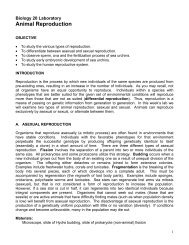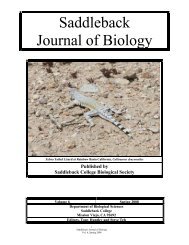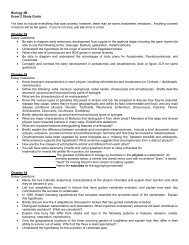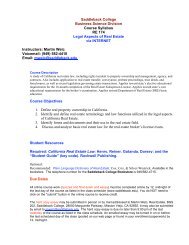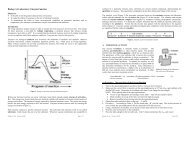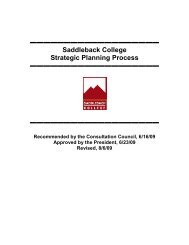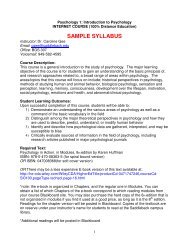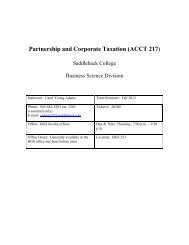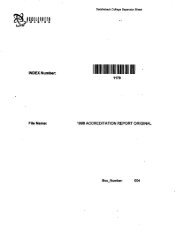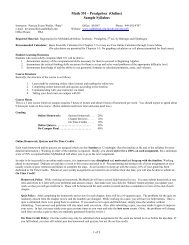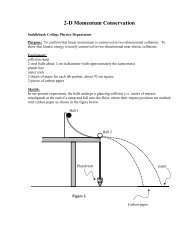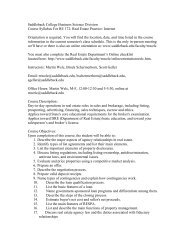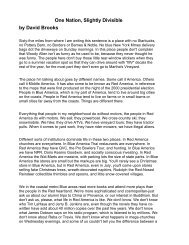Saddleback Journal of Biology - Saddleback College
Saddleback Journal of Biology - Saddleback College
Saddleback Journal of Biology - Saddleback College
Create successful ePaper yourself
Turn your PDF publications into a flip-book with our unique Google optimized e-Paper software.
Fall 2009 <strong>Biology</strong> 3B Paper<br />
40<br />
35<br />
Sprint Time (seconds)<br />
30<br />
25<br />
20<br />
15<br />
10<br />
5<br />
0<br />
Water<br />
1<br />
Gatorade<br />
Figure 2. Bar graph displaying the meanSEM for the difference <strong>of</strong> sprint time between water and Gatorade<br />
exercise runs (p=0.311, paired two-tailed t-test). Sprint time for water hydration was recorded as 21.67.6, while<br />
Gatorade was found to be 31.85.4.<br />
Discussion<br />
In the study, no significant difference was<br />
established between the VO2max and sprint time <strong>of</strong> the<br />
athletes when drinking water before testing versus<br />
Gatorade. Although the results with Gatorade did<br />
show a slight overall increase in athletic performance,<br />
they were not considered significantly different<br />
(p>0.05) than those <strong>of</strong> water. This study demonstrates<br />
that there is no advantage <strong>of</strong> hydrating before<br />
incremental exercise with Gatorade versus hydrating<br />
with water. These results agree with the original<br />
expectation that there would be no significant<br />
difference between the two groups.<br />
Khanna’s (2005) study showed opposite<br />
results, concluding that there is a significant difference<br />
in athletic performance and stamina when<br />
supplementing with a carbohydrate-electrolyte drink<br />
such as Gatorade, versus a drink with no<br />
supplementation such as water. The study showed that<br />
carbohydrate-electrolyte supplementation before<br />
exhausting exercise leads to superior performance.<br />
These results likely differ from the present study due to<br />
the fact that Khanna’s experiment tested athletes until<br />
exhaustion, lasting up to 100 minutes. The length <strong>of</strong><br />
exercise plays a large role in choosing a hydration<br />
method from a short sprint to a lengthy marathon and<br />
likely contributes to the results in the present study. If<br />
the time <strong>of</strong> exercise was increased in the study at hand,<br />
athletes would lose a greater volume <strong>of</strong> sweat<br />
enhancing the need for hydration. In addition, greater<br />
sweat loss leads to loss <strong>of</strong> sodium, potassium and other<br />
necessary electrolytes which create the osmotic<br />
gradients which help control hydration and muscle<br />
contraction (Smith 1992). Gatorade replaces these lost<br />
electrolytes and provides the body with energy in the<br />
form <strong>of</strong> carbohydrates. With a longer biking time and<br />
larger test group, a significant difference is more likely<br />
to be obtained which would demonstrate that Gatorade<br />
is a more effective hydrator than water. This could<br />
possibly lead to a higher VO2max and longer sprint<br />
time for the Gatorade test run in each subject.<br />
Acknowledgements<br />
We would like to thank Pr<strong>of</strong>essor Steve Teh<br />
for his time, help and advice. In addition, we thank<br />
<strong>Saddleback</strong> <strong>College</strong> Biological Sciences Department<br />
for allowing us to use their facilities and for loaning the<br />
Jaeger Oxycon Mobile unit used in the study. Finally,<br />
we appreciate the test subjects used in the experiment<br />
for the donation <strong>of</strong> their time.<br />
Literature Cited<br />
Bergeron, M., J. Waller, and E. Marinik. (2006).<br />
Voluntary fluid intake and core temperature responses<br />
in adolescent tennis players: sports beverage versus<br />
water. British <strong>Journal</strong> <strong>of</strong> Sports Medicine. ProQuest<br />
Health and Medical Complete, ProQuest.<br />
Duvillard, V., S. Braun, W. Mark<strong>of</strong>ski, M. Beneke, and<br />
R. Leithauser. (2004). Fluids and Hydration in<br />
Prolonged Endurance Performance. Nutrition. Vol 20,<br />
#7-8. pp651-656.<br />
Khanna, G.L., I. Manna (2005). Supplementary effect<br />
<strong>of</strong> carbohydrate-electrolyte drink on sports<br />
performance, lactate removal & cardiovascular<br />
response <strong>of</strong> athletes. Indian J Medical Resource. Vol.<br />
121. pp665-669.<br />
Smith, J. (1992). A Look at the Components and<br />
Effectiveness <strong>of</strong> Sports Drinks.<br />
<strong>Journal</strong> <strong>of</strong> Athletic Training, Vol 27. #2. pp173-176.<br />
105<br />
<strong>Saddleback</strong> <strong>Journal</strong> <strong>of</strong> <strong>Biology</strong><br />
Spring 2010



